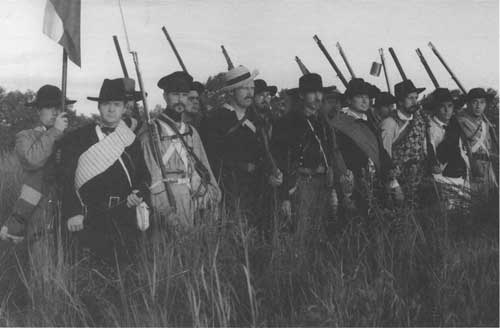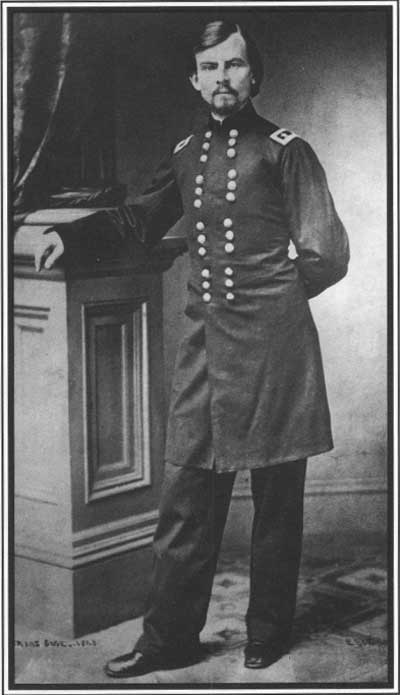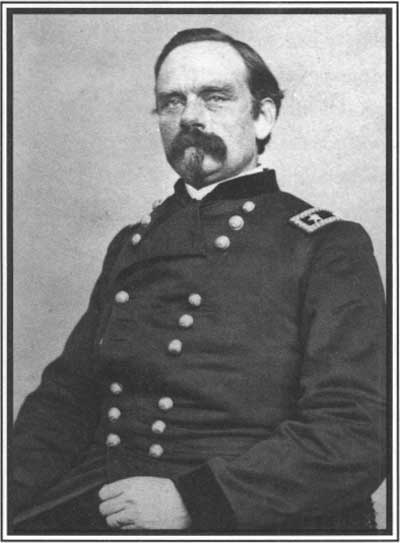|
LYON DECIDES TO ATTACK
As the southern leaders determined their course of action,
circumstances forced Lyon's hand. Word reached him that Frémont
would send no reinforcements and that he had personally led troops to
Cairo. Facing a force he believed was as much as five times his own, and
with troops leaving every day, all signs pointed to an immediate retreat
to Rolla, especially after Lyon learned of McCulloch's advance to Wilson
Creek. When scouts reported that they were clashing often with rebel
horsemen on Grand Prairie, just west of town, Lyon recognized that he
might well have to evacuate Springfield or face being surrounded. The
arrival of a wagon train with provisions, bringing the troops clothing,
shoes, and full rations for the first time in three weeks, brightened
spirits, but Lyon remained morose. Schofield, now Lyon's chief of staff,
recalled that a "morbid sensitiveness" to the inevitable disaster that
would befall the residents of the region if the army were forced to
retreat swept his normally determined commander. An exhausted Lyon had
lost the mental energy that had characterized his entire career. He
planned a night attack for the early hours of August 7, confessing that
"my only hope of success is in a surprise," only to cancel the advance
after "he had a premonition that a night attack would prove disastrous."
Only after Sweeny's passionate speech at a late night council of war in
favor of remaining did Lyon's spirit revive.

|
ARMED WITH HUNTING RIFLES, SHOTGUNS, AND OLD MILITARY PIECES AND LARGELY
UNIFORMED CIVILIAN CLOTHING, THE MISSOURI STATE GUARD FORMED THE
BACKBONE OF THE SOUTHERN ARMY AT THE BATTLE. PICTURED HERE ARE
REENACTORS AT WILSON'S CREEK NATIONAL BATTLEFIELD. (NPS)
|
On the evening of August 8, as the southern force probed his lines
south of Springfield, Lyon determined to seize the initiative. At a
council with his subordinates, he announced an audacious plan. "We shall
attack [the enemy] in his position, and endeavor to hurt him so that he
cannot follow us," he declared. "I propose to march this evening with
all our available force . . . throw our whole force upon him at once,
and endeavor to rout him before he can recover from his surprise." With
half of his volunteers scheduled to leave within a week, time was of the
essence and Lyon chose to act. More personally, he could not pull back
without punishing the secessionists, casting off sound military judgment
in favor of his own purpose. Despite the remonstrances of some of his
staff, Lyon determined to move out the following evening for a daybreak
attack on August 10.
Early the next morning, Lyon received his only communication from
Frémont, claiming that he had grossly overestimated the southern
force in his front and directing that if he were "not strong enough to
maintain his position as far in advance of Springfield, he should fall
back toward Rolla until reinforcements should meet him." While not
ordering Lyon back, the wording was clear that Lyon was on his own and
would bear the consequences of his actions. Lyon was incensed, shouting,
"God damn General Frémont! He is a worse enemy to me and the
Union cause than Price and McCulloch and the whole damned tribe of
rebels in this part of the State!" While the federal commander was still
angry and vulnerable, Sigel—just promoted to brigadier general,
though he would not learn of it until after the approaching
battle—approached Lyon privately with an alternate plan of attack.
Impetuous himself, but with the nearly blind loyalty from his German
soldiers (who made up almost half of Lyon's troops), Sigel suggested
dividing the attacking force into two assaults. One, under Lyon, would
attack as per the original plan. The other, under Sigel consisting of
two regiments of volunteers, would circle to the southeast of the enemy
camp and launch a simultaneous assault on the unsuspecting rear of the
southern force. If the pincer plan worked, the entire camp would be a
mass of confusion and would flee before the combined federal
assaults.

|
GENERAL FRANZ SIGEL (MHS)
|
The plan was even riskier than Lyon's. Sigel proposed dividing a
heavily outnumbered force in the very face of the enemy. Yet Lyon
accepted it—he believed he had no choice. During the last days of
July hundreds of the volunteers, many of them German Americans from St.
Louis had marched out of Springfield. The dire troop situation forced
Lyon to rely heavily on his remaining German recruits. With the phrase
"I fights mit Sigel" nearly axiomatic among the proud German troops, and
because so many of them could soon leave, Lyon needed desperately to
maintain Sigel's unqualified support. He assented to Sigel's rash plan
and unveiled it at an afternoon meeting with his officers some of whom
voiced strong opposition. Later that evening, he admitted to his most
trusted subordinates that Frémont won't sustain me. Sigel has a
great reputation, and if I fail against his advice it will give Sigel
command and ruin me. Then again, unless he can have his own way, I fear
he will not carry out my plans."

|
MAJOR PETER J. OSTERHAUS LED A BATTALION OF THE SECOND MISSOURI INFANTRY
IN THE FIGHTING ON BLOODY HILL.
|
Sometime after his conversation with Sigel, Lyon received a message
from Captain David S. Stanley, commanding a company of U.S. Cavalry,
reporting the latest of nearly daily skirmishes on Grand Prairie, west
of Springfield. The federals had captured six southern horsemen who
identified themselves as members of a foraging party from the Missouri
State Guard and said that the State Guard was now united with
McCulloch's Confederates and Arkansas State Troops at Wilson Creek.
Consequently, Lyon became convinced that his enemies were united ten
miles southwest of Springfield and ordered a reconnaissance south along
the Wire Road. In part he was relieved, knowing that he was not about to
be flanked and cut off from Rolla. Yet he also surmised that the attack
slated to begin that evening would pit the five-thousand-odd men of the
Army of the West against an enemy he thought to be four times its size.
Sigel's risky plan now looked reckless, yet Lyon in no way changed it.
He ordered the men to be prepared to march at 6 P.M.
|
|
